calsfoundation@cals.org
Hillary Clinton (1947–)
Hillary Clinton was the first lady of Arkansas, first lady of the United States, United States senator from New York (marking the first time in the nation’s history that a first lady was elected to the Senate), and Secretary of State in the administration of President Barack Obama. She was the only U.S. first lady to keep an office in the West Wing among the president’s senior staff and the only first lady to run for president. Her independence and public involvement with a number of issues often made her a subject of controversy, but her support of women’s and children’s issues won her many admirers. In 2016, she became the first woman nominated for president by a major political party, though she failed to win the general election.
Early Life
Hillary Diane Rodham was born in Chicago, Illinois, on October 26, 1947, the oldest of three children. Her father, Hugh Ellsworth Rodham, had a drapery supply business, and her mother, Dorothy Emma Howell Rodham, was a homemaker. The family moved from their apartment when Rodham was four to a house in suburban Park Ridge, Illinois, where she was an excellent student and class leader. She enjoyed sports, played piano, and was a National Merit Scholarship finalist and a member of the National Honor Society. She was active in her Methodist youth group, organizing a babysitting service for immigrants. She earned numerous Girl Scout merit badges and won community service awards from the Daughters of the American Revolution (DAR) and was interested in politics from a young age.
In 1965, she was voted Most Likely to Succeed upon graduation from Maine Township High School South, where she was in the top five percent of her class. That year, she left for Wellesley College near Boston, graduating four years later with high honors. On May 31, 1969, as Wellesley College Government Association president, she was the first student to give the commencement address, which was featured in Life magazine.
After a summer working for what became the Children’s Defense Fund, she entered Yale Law School in New Haven, Connecticut, in the fall of 1969, serving on the editorial board of the Yale Review of Law and Social Action. At Yale, she showed concern for protecting the interests of children and families as well as combining social activism with a legal career.
In 1971, her second year of law school, she was in the Yale Law Library when she noticed a fellow student looking at her. She walked over, introduced herself and learned his name: Bill Clinton of Arkansas.
Early Involvement in Politics
Clinton and Rodham spent the summer of 1972 in San Antonio, Texas, where he was one of three people running George McGovern’s presidential campaign. Rodham worked for Anne Wexler, a veteran campaigner she knew from Connecticut. She helped register voters, especially new voters in the 18–21 age group, African Americans, and Hispanics, though she did not speak Spanish. She also helped run the campaign in San Antonio, including a campaign stop by McGovern at the Alamo. After graduation from law school in 1973, Clinton returned to Arkansas to teach law while Rodham moved to Washington DC, working for the Children’s Defense Fund and then for the House Judiciary Committee’s impeachment proceedings on President Richard Nixon’s involvement in Watergate.
She impressed her colleagues in Washington and was offered many lucrative jobs on the East Coast after the committee disbanded. But she later said that she “followed her heart” to Arkansas, where she joined Clinton in Fayetteville (Washington County), teaching at the University of Arkansas School of Law. There, Rodham taught criminal and constitutional law, ran a legal services clinic, performed prison projects, and did advocacy work while Clinton embarked on his political career.
In 1974, she assisted in Clinton’s first run for political office from his campaign headquarters at 824 North College Avenue in Fayetteville. He sought the U.S. House of Representatives seat in Arkansas’s Third Congressional District, held by incumbent John Paul Hammerschmidt of Harrison (Boone County). Clinton lost to the popular incumbent, though by only four percentage points. Rodham’s organizational skills were credited for this strong showing.
During the congressional campaign, Rodham made political contacts and personal friendships around the state and decided to stay in Arkansas. She married Clinton on October 11, 1975, at 930 California Street in Fayetteville, the home where they lived while both taught law at the University of Arkansas (now the Clinton House Museum).
Then, in 1976, Bill Clinton was elected Arkansas Attorney General, and they moved to the state capital. Rodham continued using her maiden name, teaching law school in Little Rock (Pulaski County) and directing the school’s legal aid clinic. She was hired by Little Rock’s prestigious Rose Law Firm, where she would eventually become the first woman named full partner. In 1977, President Jimmy Carter appointed her to the board of the Legal Services Corporation, the same year she helped to found Arkansas Advocates for Children and Families.
First Lady of Arkansas
In 1978, she worked on Bill Clinton’s successful gubernatorial campaign in which, at age thirty-two, he became the nation’s youngest governor. He would go on to serve five terms as Arkansas governor. She continued as an attorney specializing in patent infringement and intellectual property law at the Rose Law Firm. During this time, she was twice named to the list of “The 100 Most Influential Lawyers in America” by the National Law Journal.
Their daughter, Chelsea Victoria Clinton, was born on February 27, 1980, the same year Hillary became a partner at Rose Law Firm. In the 1980 election, Clinton lost the governor’s race to Frank White, whom he in turn defeated in 1982. That year, Hillary took the Clinton name, which some said was for political reasons and others said was out of consideration for their child. From 1982 to 1992, she continued working as lawyer and social activist, sharpening her campaign skills, and helping Clinton to win four reelection campaigns as they gained national reputations as rising stars in the Democratic Party.
In 1983, Bill Clinton named Hillary as head of Arkansas Education Standards Committee to improve the state’s education system. While serving as Arkansas’s first lady for twelve years, she worked as an attorney for Arkansas corporations such as Walmart Inc. and TCBY, also serving on the board of Arkansas Children’s Hospital, Legal Services, and Children’s Defense Fund. She was named Arkansas Woman of the Year in 1983, Arkansas Young Mother of the Year in 1984, and in 1989, she was listed among the state’s best business-litigation attorneys.
First Lady of the United States
In 1992, Bill Clinton was elected the nation’s forty-second president. During his two terms (1993–2001), Hillary Clinton became one of the most-traveled first ladies in U.S. history. In 1995, she began a weekly newspaper column, “Talking it Over.” That same year, she published the book It Takes a Village and Other Lessons Children Teach Us, which won a Grammy Award in 1997 for her audio recording of it. She also published the books An Invitation to the White House and Dear Socks, Dear Buddy: Kids’ Letters to the First Pets.
Clinton is remembered for being named by her husband early in his presidency to lead the President’s Task Force on Health Care Reform. She was the first U.S. first lady to direct such an undertaking. She oversaw research, fact-finding trips, financial reports, and a number of committees composed of medical, insurance and governmental officials, consumer rights advocates, and other interested parties. When their proposal was attacked as being too complicated or leading to “socialized medicine,” the Clinton administration decided not to push for a vote in either the Senate or House, and the plan was essentially abandoned in September 1994.
During her tenure as first lady, Hilary Clinton became embroiled in several controversies that were amplified by the news media and in which no wrongdoing was ever proven. They included what came to be known as “Travelgate,” which involved the White House travel office and fellow Arkansan Harry Z. Thomason. Other “gates” include “Whitewatergate,” a real estate transaction with Arkansans Jim and Susan McDougal; “Cattlegate,” an investment in livestock futures; “Billing-gate,” the search for missing billing files from her tenure at the Rose Law Firm; “Filegate,” involving White House records, and “Monicagate,” which led to impeachment proceedings against Bill Clinton. He was later found not guilty of the charges. Following her husband’s revelations of his improper relationship with White House intern Monica Lewinsky, Clinton said publicly that her husband lied at first to her, as well as to the nation, and did not disclose the truth to her until two days before his testimony to the grand jury. She called his actions “the most devastating, shocking and hurtful experience of my life,” but chose famously to “stand by her man,” a choice which was both praised (for her loyalty) and criticized (for not leaving him due to political, feminist, or anti-feminist reasons).
United States Senator
As their term in the White House concluded, Hillary Clinton campaigned to become a U.S. senator from New York, being elected on November 7, 2000; she was reelected in 2006. She chaired the Senate Democratic Steering and Outreach Committee, which is responsible for communicating with the public about key issues before Congress. Senator Clinton served on the Health, Education, Labor, and Pensions Committee; the Environment and Public Works Committee; the Special Committee on Aging, and she was the first senator from New York to serve on the Senate Armed Services Committee.
In 2004, the Department of Defense asked her to serve as the only Senate member of the Transformation Advisory Group to the Joint Forces Command. In the Senate, she sponsored legislation to expand health benefits for members of the National Guard and Army Reserve. She also continued her work for children and families by sponsoring or supporting legislation in such areas as the safety of prescription drugs for children (included in the Best Pharmaceuticals for Children Act), working to strengthen the Children’s Health Insurance Program to increase coverage for children in low-income working families, and advocating efforts to address environmental hazards in schools.
Clinton’s memoir, Living History, was published on June 1, 2003. It was the fifth bestselling hardcover nonfiction book that year, and the New York Times named it one of the bestselling paperbacks of 2004.
On January 20, 2007, she announced her candidacy for the presidency of the United States. Though widely viewed as the frontrunner for the Democratic nomination, she placed third in the Iowa Democratic Caucus in January 2008. She subsequently won the New Hampshire primary. The nomination process, which soon became a rather even struggle between her and U.S. Senator Barack Obama, stretched out until June, when Obama finally garnered enough delegates to secure the nomination. However, Clinton ended her presidential primary campaign having received more votes than any other woman in history.
Secretary of State
After Obama was elected president, he chose Clinton as his nominee for the position of Secretary of State, and on January 21, 2009, she was confirmed by the U.S. Senate by a vote of ninety-four to two. In her four years with the State Department, she logged almost one million air miles and visited more than 100 countries. On February 1, 2013, Clinton stepped down from her post as Secretary of State, saying she planned to write another book and spend more time with her family. In June 2014, her memoir of her tenure as secretary of state, Hard Choices, was published by Simon & Schuster.
Clinton has been the target of criticism concerning her actions relating to the September 2012 Islamic militants’ attack on the U.S. diplomatic compound in Benghazi, Libya. The attack resulted in the death of two officials, including U.S. ambassador J. Christopher Stevens. That same day, a second attack at another compound killed two Central Intelligence Agency (CIA) contractors. Much of the negative publicity concerned Clinton’s initial claim that the attacks were a spontaneous reaction to an anti-Muslim video, Innocence of Muslims, rather than premeditated terrorist actions. It was also revealed that State Department officials had denied additional security for the diplomatic mission in Benghazi prior to the attack; Secretary Clinton later took responsibility for this in a congressional hearing on the subject.
Additional controversy relating to Clinton’s time as Secretary of State developed when it was discovered in 2015 that Clinton had used a personal e-mail account in conducting her everyday operations at the State Department and that no attempts were made to preserve her email records, as required by the Federal Records Act. The use of such a private account caused immediate concerns for national security, as well as the proper historical preservation of correspondence. Clinton stated in a press conference addressing the issue that she chose to use a private, secure e-mail server out of personal convenience. On July 5, 2016, Director James Comey of the Federal Bureau of Investigation (FBI) announced that Clinton had essentially been cleared of deliberate wrongdoing but that her handling of confidential information was “extremely reckless.”
Presidential Candidate
On April 12, 2015, Clinton announced that she would be a candidate for the presidency of the United States in a bid to be the 2016 Democratic nominee. At the end of a short video, she declared her candidacy with the words, “I’m running for president.” She faced off against U.S. senator Bernie Sanders of Vermont, former Maryland governor Martin O’Malley, former Rhode Island governor Lincoln Chaffee, and former U.S. senator Jim Webb of Virginia. O’Malley, Chaffee, and Webb dropped out early in the contest, winning no states. Clinton won thirty-four contests against Sanders’s twenty-three. On July 26, 2016, she was officially nominated the Democratic Party’s candidate for president, becoming the first woman to achieve this.
Clinton squared off against Donald J. Trump, a New York real estate mogul and reality television star who emerged victorious from a crowded field of sixteen other candidates to become the Republican Party nominee. Many media polls reported that the two candidates both had low favorability ratings, and the presidential contest was regularly described as one of the most divisive in recent history. Trump, in particular, regularly referred to Clinton as “Crooked Hillary” and made calls for her imprisonment during his stump speeches, as well as at the Republican National Convention. Clinton, however, was able to capitalize on Trump’s reported misogyny (including allegations of sexual harassment and assault) and his support for punitive anti-immigrant policies (including the construction of a massive border wall) in order to gain greater support from female and Latino voters.
Buoyed by strong debate performances, Clinton had established a strong lead by late October. However, on October 28, James Comey, head of the FBI, announced the discovery of another set of emails relating to Clinton’s time as secretary of state found on the laptop of former New York congressman Anthony Weiner (who was married to Clinton advisor Huma Abedin). The announcement, so soon before the election, reinvigorated the Trump campaign but also raised concern among many who feared the possibility of the FBI interfering in the presidential election. On November 6, Comey reported that a review of the emails revealed no new information that would change the agency’s original assessment of the matter. Two days later, however, Clinton lost the general election against Trump, failing to receive the needed number of Electoral College votes despite winning the popular vote by more than 2.8 million votes. She published her book about the campaign and election, What Happened, in September 2017.
Personal Life
The Clintons have a residence in Chappaqua, New York, maintain a home in Washington DC, and have an apartment at the Clinton Presidential Center in Little Rock. At the center, there is a display of her photos, inaugural gowns, and a table setting of White House china she designed for the millennium celebration. In July 2013, the children’s library of the Central Arkansas Library System was named in Clinton’s honor to recognize her work on children’s and educational initiatives during her time in the state. In 2015, she was one of the inaugural inductees into the Arkansas Women’s Hall of Fame. In 2019, she and daughter Chelsea published The Book of Gutsy Women: Stories of Courage and Resilience. In 2021, she released a political thriller titled State of Terror and co-authored with Louise Penny. In spring 2022, Clinton played the offstage role of the Giant (voice recorded) in a production of Stephen Sondheim’s Into the Woods at the Arkansas Repertory Theatre. Her book Something Lost, Something Gained: Reflections on Life, Love, and Liberty was released in September 2024.
President Joe Biden awarded Hillary Clinton the Presidential Medal of Freedom on January 4, 2025.
During Bill Clinton’s 1992 presidential campaign, Hillary Clinton said, “Our lives are a mixture of different roles. Most of us are doing the best we can to find whatever the right balance is. For me, that balance is family, work and service.” She has also said, “I have never been as good or as bad as my most fervid supporters and opponents claimed.”
For additional information:
Allen, Jonathan, and Amie Parnes. HRC: State Secrets and the Rebirth of Hillary Clinton. New York: Crown, 2014.
Bamberger, Joanne Cronrath. Love Her, Love Her Not: The Hillary Paradox. Berkeley, CA: She Writes Press, 2015.
Barth, Jay. “Hillary in Arkansas.” Arkansas Times, November 3, 2016, pp. 14–22. Online at http://www.arktimes.com/arkansas/hillary-in-arkansas/Content?oid=4688589 (accessed August 2, 2023).
Bordo, Susan. The Destruction of Hillary Clinton. New York: Melville House, 2017.
Cargile, Ivy A. M., Denise S. Davis, Jennifer L. Merolla, and Rachel VanSickle-Ward, eds. The Hillary Effect: Perspectives on Clinton’s Legacy. New York: I. B. Tauris, 2020.
Chafe, William H. Bill and Hillary: The Politics of the Personal. New York: Farrar, Straus and Giroux, 2012.
Chozick, Amy. Chasing Hillary: Ten Years, Two Presidential Campaigns, and One Intact Glass Ceiling. New York: HarperCollins, 2018.
Clinton, Hillary Rodham. Hard Choices. New York: Simon & Schuster, 2014.
———. It Takes A Village. New York: Simon & Schuster, 1996.
———. Living History. New York: Simon & Schuster, 2003.
———. What Happened. New York: Simon & Schuster, 2017.
Creedon, Pamela J., and Laura A. Wackwitz. “Hillary Rodham Clinton: Leadership, Legacy, and the Politics of Charisma.” In America in Crisis: Presidential Power, Populism, and the Global Struggle for Truth, edited by Adebowale Akande. London: Springer Nature, 2025.
D’Antonio, Michael. The Hunting of Hillary: The Forty-Year Campaign to Destroy Hillary Clinton. New York: Thomas Dunne Books, 2020.
Estrich, Susan. The Case for Hillary Clinton. New York: Regan Books, 2005.
“Hillary Rodham Clinton.” David and Barbara Pryor for Arkansas Oral and Visual History. https://pryorcenter.uark.edu/interview.php?thisProject=Arkansas%20Memories&thisProfileURL=CLINTON-Hillary-Rodham-613&displayName=Hillary%20Rodham%20Clinton&thisInterviewee=613 (accessed May 6, 2024).
Kray, Christine A., Tamar W. Carroll, and Hinda Mandell, eds. Nasty Women and Bad Hombres: Gender and Race in the 2016 Presidential Election. Rochester, NY: University of Rochester Press, 2018.
Lehn, Melody Joy. “‘Talking It Over’ with Hillary: Domestic and Global Advocacy, 1995–2000.” PhD diss., University of Memphis, 2013. Online at https://digitalcommons.memphis.edu/etd/782/ (accessed August 2, 2023).
Leveritt, Mara. “The First Lady Removes Her Gloves.” Arkansas Times, August 27, 1992, pp. 14–15, 20–21.
———. “Hillary on Her Own Terms.” Arkansas Times, October 1989, pp. 32–35, 102.
Lockhart, Michele, and Kathleen Mollick, eds. Hillary Rodham Clinton and the 2016 Election: Her Political and Social Discourse. Lanham, MD: Lexington Books, 2015.
Marrs, Brittany. “The Woman behind the Eagle: Impact of the Character of the First Lady on Presidential Approval Ratings.” MA thesis, Sam Houston State University, 2018. Online at https://shsu-ir.tdl.org/handle/20.500.11875/2391 (accessed August 2, 2023).
Nelson, Rex, and Philip Martin. The Hillary Factor: The Story of America’s First Lady. New York: Gallen Publishing, 1993.
Parry-Giles, Shawn J., David S. Saufer, and Xizhen Cai. Hillary Clinton’s Career in Speeches: The Promises and Perils of Women’s Rhetorical Adaptability. East Lansing: Michigan State University Press, 2023.
Sharma, Dinesh, ed. The Global Hillary: Women’s Political Leadership in Cultural Contexts. New York: Routledge, 2016.
Smith, Doug. “Out of Arkansas.” Arkansas Times, November 10, 2000, pp. 13–14, 16–19.
Smith, Gary Scott. Do All the Good You Can: How Faith Shaped Hillary Rodham Clinton’s Politics. Champaign: University of Illinois Press, 2023.
Sykes, Rachel. “Imagined Hillarys: Feminism, Fantasy, and Fictional Clintons in The Good Wife and The Good Fight.” Journal of American Studies 55 (May 2021): 312–335.
Åsard, Erik. Hillary Rodham Clinton. En politisk biography. Lund: Historiska Media, 2008.
Nancy Hendricks
Arkansas State University







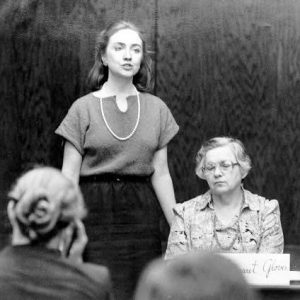

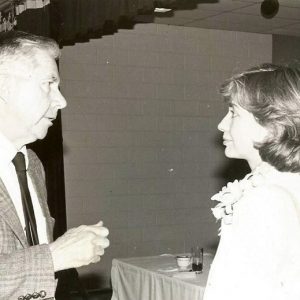
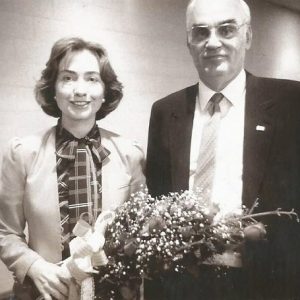
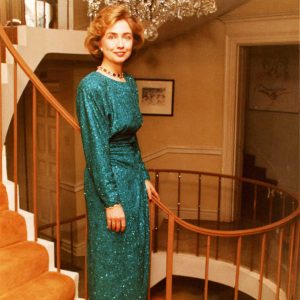
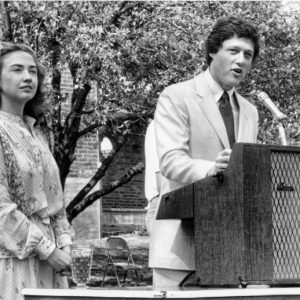


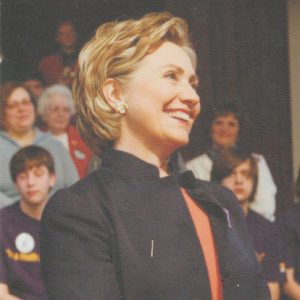





Comments
No comments on this entry yet.